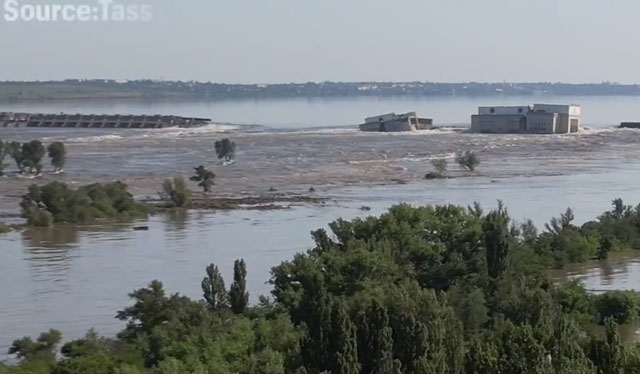
Kiev, Ukraine | Xinhua | The dam breach, coupled with the collapse of the Kakhovka hydroelectric power plant, will lead to devastating economic and ecological consequences, a Ukrainian expert has said.
“Up to 1 million people may face drinking water problems,” Oleksii Kushch, an economist at “United Ukraine” think-tank, told Xinhua in an interview Wednesday.
The Kakhovka hydroelectric power plant in southern Ukraine was destroyed on Tuesday, causing a decrease in the dam water level and massive flooding in the nearby areas.
Local authorities said at least 30 settlements have already been affected by the flooding, displacing thousands of people.
Apart from the humanitarian consequences, the catastrophe will take a heavy toll on the economic development of Ukraine’s central Dnipropetrovsk and southern Mykolayiv, Kherson, and Zaporizhzhia regions, Kushch said.
“The water use intensity in the regional gross domestic product will change significantly — industrial enterprises will lack water. These are mainly enterprises in the processing industry and metallurgy,” Kushch said, citing the industrial cities of Kryvyi Rih and Nikopol among those to be severely hit by the water crisis.
In addition, the Kakhovka disaster will stop the water supplies to about 30 irrigation systems, which irrigated about 1 million hectares of agricultural fields, the expert said, adding as a result, Ukraine may lose 10-15 percent of its agricultural potential due to indirect or direct influence (of the Kakhovka incident).
Consequently, Ukraine’s southern regions, where vegetable growing and horticulture were concentrated, may soon turn into semi-deserted areas. “The land use in this region will be changed. Instead of vegetables and moisture-loving plants, mostly unpretentious plants, primarily sunflowers, will be grown in the region,” Kushch said.
As the Kakhovka plant destruction would cause the loss of approximately 60 percent of water resources in the regional water balance of Mykolayiv, Kherson and Zaporizhzhia regions, soil salinazation may become another environmental disaster, posing risks to people’s health, he warned.
“In the absence of water and irrigation, groundwaters, which consist primarily of salt marshes in this region, will rise … Some salt marshes in the region contain heavy metals and harmful substances that could be spread by the wind. They enter the human body through the respiratory system. This can lead to an increase in serious diseases and abnormalities in the development of children,” Kushch said.
The expert estimated that the restoration of the Kakhovka plant and its structures would take about five years and require about 2 billion U.S. dollars in investment.
The attack on the Kakhovka hydroelectric power plant is possibly the most significant damage to civilian infrastructure since the start of the Ukraine crisis in February 2022, according to UN Undersecretary-General for Humanitarian Affairs and Emergency Relief Coordinator Martin Griffiths.
“The sheer magnitude of the catastrophe will only become fully realized in the coming days. But it is already clear that it will have grave and far-reaching consequences for thousands of people in southern Ukraine,” he told an emergency meeting of the UN Security Council.
The United Nations, Russia and Ukraine have all condemned the incident, while Russia and Ukraine have traded accusations over the responsibility for the attack.
In a statement on Tuesday, the Russian Foreign Ministry strongly condemned the destruction of the Kakhovka hydroelectric power plant “by the armed forces of Ukraine,” calling on the international community “to condemn the criminal acts of the Ukrainian authorities.” Earlier in the day, Ukrainian President Volodymyr Zelensky said that Russian forces had destroyed the Kakhovka dam. ■
 The Independent Uganda: You get the Truth we Pay the Price
The Independent Uganda: You get the Truth we Pay the Price


